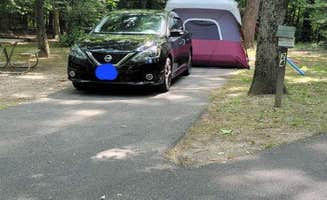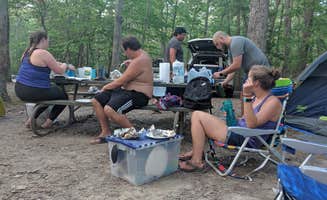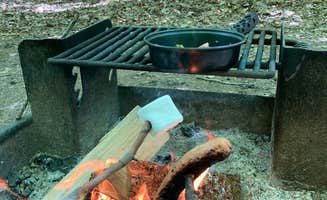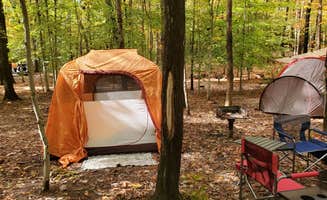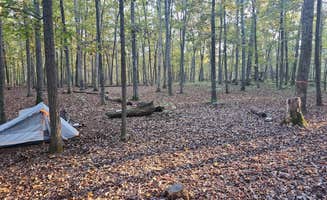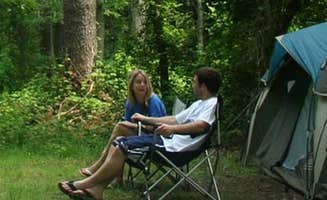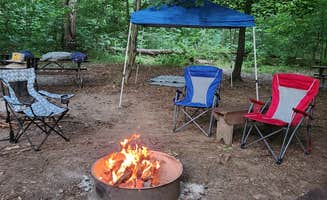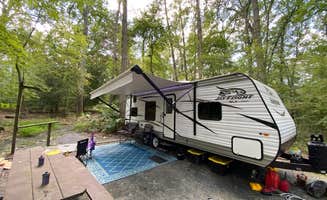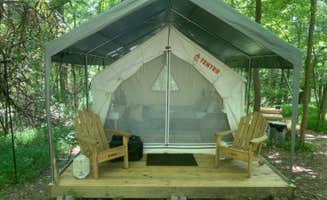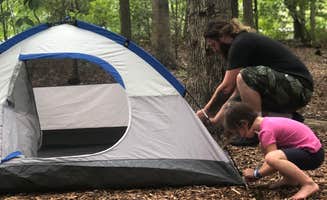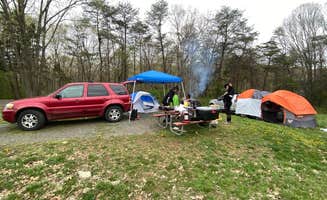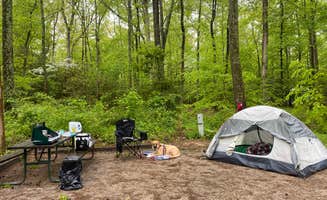Camping within 30 miles of Alexandria, Virginia ranges from basic campsites with minimal facilities to full-service campgrounds with water parks and other recreational amenities. The topography varies from riverside locations along the Potomac to wooded forest settings with trails. Summer temperatures regularly climb above 90°F with high humidity, while spring and fall camping seasons offer more moderate temperatures in the 60-80°F range.
What to do
Explore hiking networks: At Greenbelt Park Campground, campers can access numerous trails through 1,100 acres of forest. "The ADT (American Discovery Trail) passes through the park," notes one visitor who appreciates this urban wilderness area just 10 minutes from the METRO station.
Experience riverside recreation: The Potomac River shoreline at Fort Belvoir Travel Camp provides opportunities for fishing and boating. "There is a pier out into the river to fish on. The outdoor recreation center has bait, snacks, and drinks," writes one military visitor, while another notes the "eagle's nests were interesting."
Try multiple water activities: Lake Fairfax Campground offers a water park, paddle boats and other aquatic options. One camper remarked, "They have a water park, paddle boats, playgrounds, trails, skate park, sports fields, and the bathrooms are the nicest I've ever seen."
Visit nearby historical sites: The region is rich with Civil War history within short driving distance of most campgrounds. Prince William Forest Park contains abandoned military training grounds and historic structures. "There is lots and lots of history around the area. We spent 5 days camping and exploring the civil war battle areas," one visitor wrote.
What campers like
Urban-adjacent wilderness: Campers appreciate the natural settings within close proximity to urban areas. At Cherry Hill Park, visitors can enjoy nature while having easy access to Washington DC. "This was a great stop to take the kids to visit the city. Easy access and well laid out sites. They have a bus stop for metro service to the city," a reviewer noted.
Hot showers and clean facilities: Many reviewers specifically mention bathroom quality as a deciding factor. "Just can't beat it for the showers. Locking doors, individual stalls. Best camping showers I've ever had," commented one camper at Bull Run Regional Park.
Guided activities: Organized programs enhance the camping experience at several parks. "The campground had a climbing wall on one afternoon. They have a campfire complete with s'mores followed by hayrides," wrote a visitor about Bull Run Regional Park, while another mentioned "monthly programs at the campfire circle."
Wildlife viewing: Despite being near urban areas, many campgrounds offer wildlife viewing opportunities. "I noticed a family of deer grazing close by, a great way to settle in for the evening," wrote a Greenbelt camper, while another mentioned seeing "a snake, alligator snapping turtle, and rabbits, before we even reached the gates" at Cedarville State Forest.
What you should know
Insect precautions required: Ticks and mosquitoes are prevalent, particularly in summer months. At Cedarville State Forest, one camper warned, "LOTS and LOTS of ticks. I got one, but my wife and dog got about a dozen each. Just bring tweezers." Others recommend 100% DEET repellent for mosquitoes in some locations.
Urban noise factors: While offering natural settings, many campgrounds experience noise from nearby infrastructure. "Traffic can be heard but not seen. Weekdays are pretty quiet," noted a Cosca Regional Park visitor, while another camper mentioned "constant aircraft, helicopters at all times" at Cedarville.
Site leveling challenges: Uneven terrain affects many campgrounds. At Burke Lake Park, a camper observed many tent sites "were not level at all. Many tents were on a full slant." At Prince William Forest, "sites varied greatly in size. Some seemed entirely too close, others spread apart."
Reservation requirements: Most campgrounds in the area require advance bookings, especially during peak season. Louise F. Cosca Regional Park has "no registration on site, it's online only" through the county parks website, and several campgrounds enforce minimum-stay requirements on weekends.
Tips for camping with families
Water parks and play areas: Several campgrounds feature water activities specifically designed for children. At Pohick Bay Campground, "Pirate's Cove waterpark is definitely a highlight in summer," according to one visitor, while another calls it "my go-to weekend camping spot."
Programming for kids: Family-oriented activities are available at numerous locations. At Bull Run, a visitor noted, "They informed us that they had a scavenger hunt for the kids going all weekend, they had an outdoor movie scheduled for Friday night, a campfire story time scheduled for Saturday night and crafts scheduled for Sunday morning."
Spacious group sites: Some campgrounds offer designated group camping areas ideal for families camping together. "Loop A is for organized groups/youth/scouts, Loop B is for tents and RVs under 30 ft, Loop C is for tents," explained a visitor to Oak Ridge Campground, noting the different options available.
Educational opportunities: Wildlife and nature education activities are available at several parks. One Oak Ridge Campground camper mentioned, "We saw lots of wildlife but had no issues with trash or food (raccoons left everything alone)," indicating the natural setting provided educational value without nuisance animals.
Tips from RVers
Site selection matters: RVers should research specific sites before booking. At Burke Lake Park, a visitor warned, "6 of the 25 sites are unleveled so tent camping is probably the only option. This is not big rig friendly but there are pull through sites."
Electric options vary: Available power connections differ significantly between campgrounds. At Louise F. Cosca Regional Park, "Only 5 sites have electric (2, 5, 18, 24, 25) but all 25 sites have water hookup," noted one camper, providing specific site numbers for planning.
Check dump station locations: Some campgrounds have limited dumping facilities. "There's a dump station and drinking water fill in loop C. The water fill was a little annoying in that there's a handle you have to hold down the whole time, but we used a rock to prop the handle down," shared a Greenbelt Park visitor.
Limited big rig access: Several campgrounds have restrictions or challenges for larger vehicles. One Cherry Hill Park visitor advised, "Sites were spacious and decently level (depends on the site I'm sure)," while a Cedarville State Forest camper warned about "narrow" roads with "only 1 way in and 1 way out."


